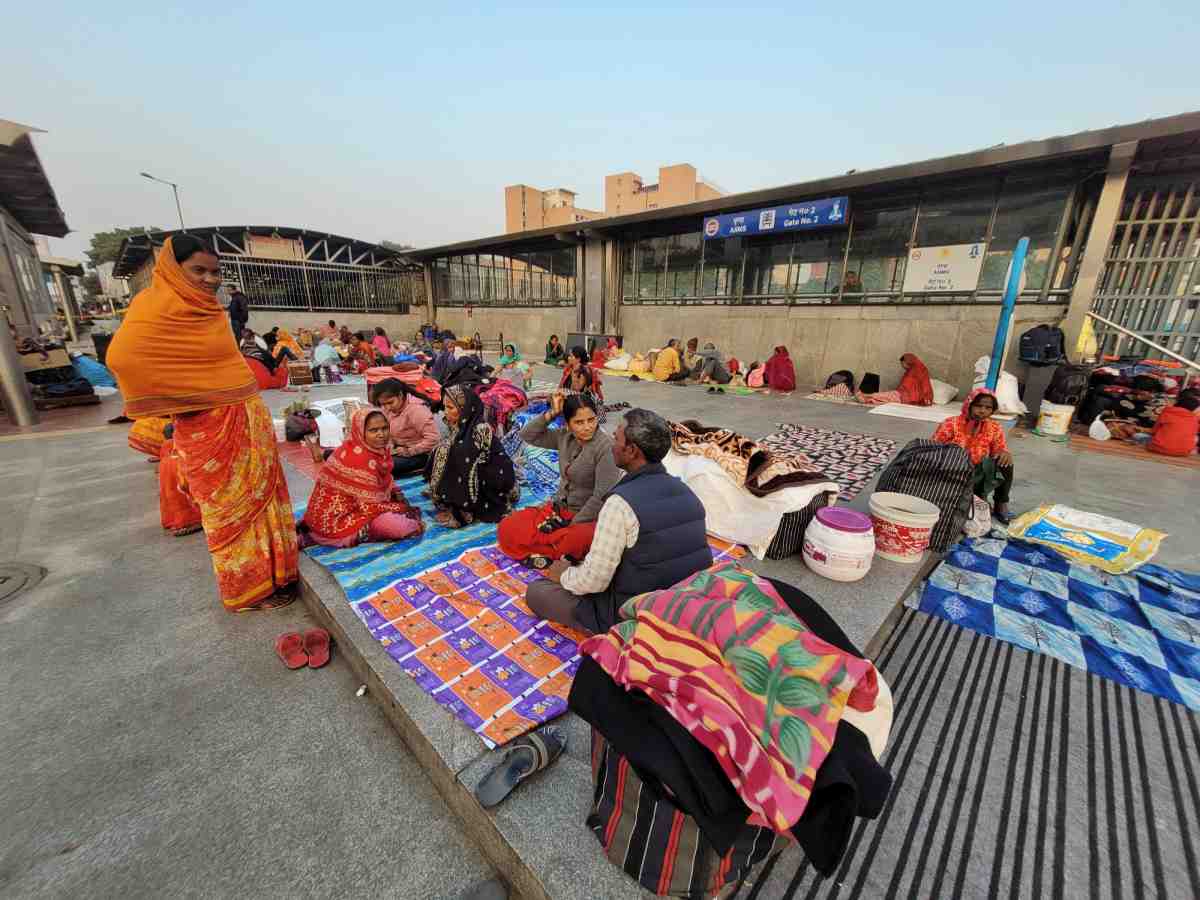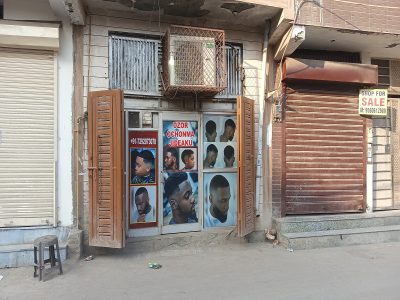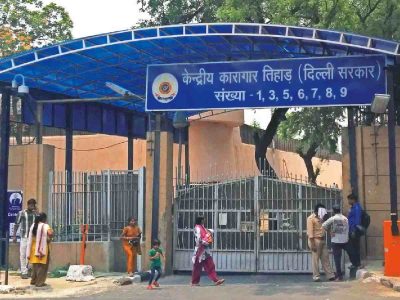Manju Devi, 48, sits anxiously with her son, Vijay Kumar, armed only with a single plastic mat for the entire family, waiting outside the emergency ward of the All India Institute of Medical Sciences (AIIMS). The emotional toll of uncertainty and the harsh conditions weigh heavily on them as they hope for news of their relative undergoing a kidney operation. Their wait grows longer with each passing moment as their relative undergoes a kidney operation, while the authorities remain oblivious to their concerns.
Having arrived from Bulandshahr in Uttar Pradesh, the family has been waiting for some respite from the harsh winter of the national capital for the past week. Despite the poor air quality and the ever-decreasing temperature, Manju’s family remains without any support or assistance. Long periods of staying without any source of clean air have made breathing almost futile for them.
Facing the biting cold at night
The ever-worsening Air Quality Index (AQI) of Delhi has made survival a struggle for Vijay’s wife and son as well. “The administration has not made any provisions for us. Even when it gets bitterly cold at night, we are left to fend for ourselves. The security here throws us out onto the streets and pavements the moment the clock strikes 7:30 PM. The entire family then has to sleep in the biting cold. We have taken to sleeping inside the subway near the metro at night, to at least preserve some body heat. It gets worse in the early morning hours,” said Manju.
Inhaling the smog-infested air of Delhi has now caused Vijay’s seven-year-old child to suffer from a spate of whooping cough. “He is already an asthma patient. On top of that, he has to stay with us under such terrible conditions. Even if the hospital authorities made provisions for us to stay inside a dormitory, it would help a lot. However, no such effort seems to have been made for the poor,” Vijay said.
Night shelters not an option for families
Another family highlighted that the authorities had asked them to look for night shelters in the area; however, owing to the fact that they had a child with them, it was never an option. “We were told by a security guard that there was a night shelter near AIIMS, but when we went there, we saw that the shelter was filled to its capacity. Moreover, that place is not suited for children. There’s trash lying everywhere, and some drunk person or the other was causing a nuisance. We decided it was safer to stay on the streets,” said a family member of an admitted patient, on the condition of anonymity.
They further said that it only made sense for the family to remain along the medical institution’s pavement, so that they could stay close to the patient in case of an emergency.
According to the Daily Occupancy Report of the Delhi Urban Shelter Improvement Board (DUSIB), the government body has 15 temporary tents set up along the medical institution. With a total capacity of 300, no such tent can be seen in the proximity of the institution. During the pandemic, a permanent shelter for around 250 people was set up, but since then, the building has been torn down.
Struggles continue for patients and their families
The homeless and the many migrants who have come to the hospital seeking treatment have been left to cope with the harsh conditions that the national capital has thrown at them.
Consequently, they have had to take to living on the streets, pavements, and under flyovers to survive.
Many patients and attendants have made the pavement outside the metro station their home. Scores of people have taken to calling this area their home, with some having lived here for multiple months.
One such person is Kiran Devi, 48, who brought her husband to AIIMS last month for treatment. Afflicted by a neural disorder, her husband barely speaks now, with only a couple of phrases escaping his mouth. Most of his interactions have devolved into basic physical gestures. However, the cold affects everyone equally, regardless of their condition. As temperatures dipped below the 11 Celsius mark, her 60-year-old husband was left shivering.
“Even with the winter season upon us, there has been no help provided to us by the hospital. I have brought my blanket, and that is the only source of support my husband and I have. They have given us time till December 4 for the operation to commence, but until then, even my husband, who is a patient, will have to survive the pollution and the cold here,” Kiran said.
Among the scores of families, some patients remain without support. Unlike those escorted by their families, a few patients have had to arrive at the hospital by themselves. Without anyone to support them, they feel increasingly hopeless as the days pass. Lallan Thakur, a resident of Bihar, awaits with bated breath for his kidney operation.
Having waited for over a week, his patience is wearing thin as he grows weaker by the day. The persistently poor AQI in the national capital has not made it any easier. “They have given me a date of December 2, but it is difficult to stay like this on the road when the temperatures drop drastically. I have only brought a couple of bedsheets from home to help me manage the cold, but I am not carrying enough clothes for the winter,” Thakur said.
His plastic mat, worn too small for his stature, is his only respite from the cold mornings. Thus, at night, he takes to staying inside the subway, which has turned into a makeshift resting place for many seeking treatment.
Also read: ASI plans stricter regulations for filmmakers violating shooting norms at Delhi monuments
However, due to extremely unhygienic conditions, Jha mostly prefers to remain outside. “There are no bathrooms in the area, so the entire subway system stinks most of the time,” he said.
Inside the subway, over 50 people have made it their temporary home. With the winter season setting in, the crowd is only set to increase. “It’s not as cold as outside, but a lack of toilets and dumping space has made it unbearable. Unfortunately, we have no other place to go,” said a patient staying inside the subway, on the condition of anonymity.
According to the Delhi government’s Winter Action Plan, 200-250 waterproof and fire retardant pagoda tents are to be set up to accommodate around 2,000 individuals. These tents will supplement the 197 shelters operated by the Delhi Urban Shelter Improvement Board (DUSIB), which currently provides shelter to 7,092 people.
The winter action plan, backed by a Rs 3 crore budget, will be in effect from November 15, 2024, to March 15, 2025. Moreover, 16 teams are supposed to be formed to operate between 10 pm and 4 am, rescuing individuals from open spaces and transporting them to shelters or hospitals.
However, much of the on-ground implementation remains lacking.





